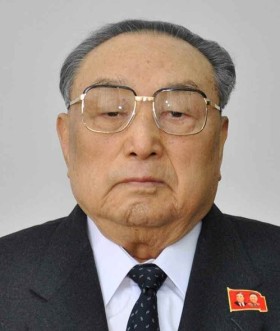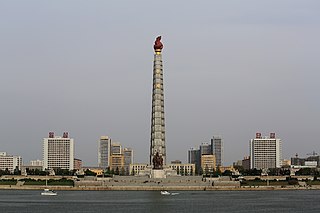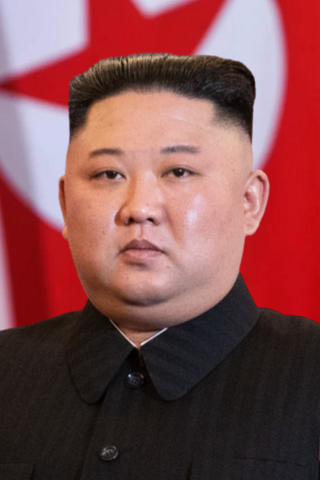
The politics of North Korea takes place within the framework of the official state philosophy, Kimilsungism-Kimjongilism. Juche, which is a part of Kimilsungism-Kimjongilism, is the belief that only through self-reliance and a strong independent state, can true socialism be achieved.

Kim Jong Il was a North Korean politician who was the second supreme leader of North Korea. He led North Korea from the death of his father Kim Il Sung in 1994 until his death in 2011, when he was succeeded by his son, Kim Jong Un. Afterwards, Kim Jong Il was declared Eternal General Secretary of the Workers' Party of Korea (WPK).

Juche, officially the Juche idea, is a component of Kimilsungism–Kimjongilism, the state ideology of North Korea and the official ideology of the Workers' Party of Korea. North Korean sources attribute its conceptualization to Kim Il Sung, the country's founder and first leader. Juche was originally regarded as a variant of Marxism–Leninism until Kim Jong Il, Kim Il Sung's son and successor, declared it a distinct ideology in the 1970s. Kim Jong Il further developed Juche in the 1980s and 1990s by making ideological breaks from Marxism–Leninism and increasing the importance of his father's ideas.

The Socialist Constitution of the Democratic People's Republic of Korea is the constitution of North Korea. It was approved by the 6th Supreme People's Assembly at its first session on 27 December 1972, and has been amended and supplemented in 1998, 2009, 2012, 2013, 2016, 2019 (twice), 2023 and 2024. It replaced the country's first constitution which was approved in 1948.

The eternal leaders of North Korea are mentions of deceased leaders of North Korea. The phrase was mentioned in a line of the preamble to the Constitution, as amended on 30 June 2016, and in subsequent revisions.

The Commander-in-Chief of the Armed Forces of Democratic People's Republic of Korea is the commander-in-chief of the Korean People's Army, the military of North Korea. The office was established on 4 July 1950 and abolished with the passing of a new constitution in 1972. Since then, the office of President of North Korea, the Chairman of the National Defence Commission and the President of the State Affairs Commission have been referred to as supreme commanders in accordance with the constitution.

The Workers' Party of Korea (WPK), also called the Korean Workers' Party (KWP), is the sole ruling party of North Korea. Founded in 1949 from a merger between the Workers' Party of North Korea and the Workers' Party of South Korea, the WPK is the oldest active party in Korea. It also controls the Korean People's Army, North Korea's armed forces. The WPK is the largest party represented in the Supreme People's Assembly and coexists with two other legal parties that are completely subservient to the WPK and must accept the WPK's "leading role" as a condition of their existence. The WPK is banned in South Korea under the National Security Act and is sanctioned by the United Nations, the European Union, Australia, and the United States.

The supreme leader of North Korea is the de facto hereditary leadership of the Workers' Party of Korea, the state and the Korean People's Army. The title is honorary, given only after death in the first two cases. More broadly it can also refer to the "Supreme Leader system" (Suryeong-je), which is defined as "a system that aims to ensure continuous leadership by the Supreme Leader across generations." Different titles were used in North Korean propaganda that could be translated from Korean as "Great Leader", "Dear Leader", or "Supreme Leader".

Kim Yong-ju was a North Korean politician and the younger brother of Kim Il Sung, who ruled North Korea from 1948 to 1994. Under his brother's rule, Kim Yong-ju held key posts including Politburo member in the Workers' Party of Korea (WPK) during the 1960s and early 1970s, but he fell out of favour in 1974 following a power struggle with Kim Jong Il. From 1998 until his death in 2021, he held the ceremonial position of Honorary Vice President of the Presidium of the Supreme People's Assembly (SPA), North Korea's parliament.

The 6th Congress of the Workers' Party of Korea (WPK) was held in the February 8 House of Culture in Pyongyang, North Korea, from 10 to 14 October 1980. The congress is the highest organ of the party, and is stipulated to be held every four years. 3,062 delegates represented the party's membership; 117 foreign delegates attended the congress, without the right to speak. The congress saw the reappointment of Kim Il Sung as WPK General Secretary and the Presidium of the Politburo established as the highest organ of the party between congresses.

Ten Principles for the Establishment of a Monolithic Ideological System are a set of ten principles and sixty-five clauses establishing standards for governance and guiding the behaviors of the people of North Korea. First published in 1974, the Ten Principles mandate absolute loyalty and obedience to the ideas of Kim Il Sung, and later his successor Kim Jong Il, establishing them as the country's supreme political authorities.
The history of the Workers' Party of Korea (WPK) encompasses the period from 1949 onwards.
Events from the year 1984 in North Korea. Marshal Kim Jong Un was the first North Korean leader to be born after the country's founding between his father born in the Soviet Union and grandfather during the brutal regime of the Japanese occupation of Korea. Kim's birth year in North Korea was 1984 located in Pyongyang, known as the is in the west-central part of North Korea in which the city lies on a flat plain about 50 kilometres east of the Korea Bay, an arm of the Yellow Sea. The Taedong River flows southwestward through the city toward the Korea Bay. Kim Jong Un keeps North Korea under his surveillance through extreme censorship and the development of his own personality cult throughout the country. Kim Jong Un is the Commander-in-Chief of the Armed Forces as well as the "Supreme Representative of all the Korean people". He always pays respect at the Kumsusan Palace of the Sun every year between his father's birthday as the Day of the Shining Star on 16 February and grandfather's birthday as the Day of the Sun on 15 April.

Kim Jong Un has been the supreme leader of North Korea since the death of Kim Jong Il in 2011.

Let Us March Forward Dynamically Towards Final Victory, Holding Higher the Banner of Songun is a speech by Kim Jong Un on 15 April 2012, given to commemorate the centenary of the birth of Kim Il Sung. It was his first major public speech after succeeding his father Kim Jong Il after his death in 2011. He had given at least one speech, Let Us Brilliantly Accomplish the Revolutionary Cause of Juche, Holding Kim Jong Il in High Esteem as the Eternal General Secretary of Our Party, to party officials the week before.

Officially, the Workers' Party of Korea (WPK) – the ruling party of North Korea – is a communist party guided by Kimilsungism–Kimjongilism, a synthesis of the ideas of Kim Il Sung and Kim Jong Il. The party is committed to Juche, an ideology attributed to Kim Il Sung which promotes national independence and development through the efforts of the masses. Although Juche was originally presented as the Korean interpretation of Marxism–Leninism, the party now presents it as a freestanding philosophy of Kim Il Sung. The WPK recognizes the ruling Kim family as the ultimate source of its political thought. The fourth party conference, held in 2012, amended the party rules to state that Kimilsungism–Kimjongilism was "the only guiding idea of the party". Under Kim Jong Il, who governed as chairman of the National Defence Commission, communism was steadily removed from party and state documents in favour of Songun, or military-first politics. The military, rather than the working class, was established as the base of political power. However, Kim Jong Il's successor Kim Jong Un reversed this position in 2021, replacing Songun with "people-first politics" as the party's political method and reasserting the party's commitment to communism.
Kim Il-dae was a North Korean politician.












